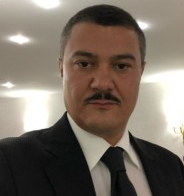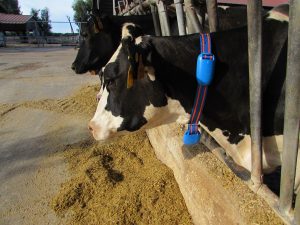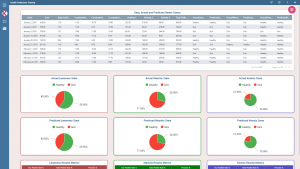
In this edition of our Interview Series, we talk to Antonio Caruso from Engineering Ingegneria Informatica S.p.A. (ENG), Italy to learn more about the pilot he is leading in Pilot Cluster 4.
- Can you tell us a bit about yourself, your organisation and your involvement in the DEMETER project?
I’m Antonio Caruso, technical manager at Engineering Ingegneria Informatica S.p.A. (ENG), Italy. I’m part of the R&D Department and I’m mainly involved in the smart industry and agri-food sector related projects. Over the years I have been participating in a series of Italian and European research projects, gaining significant technical and technological experiences which I’m applying in this ambitious project. I believe that DEMETER represents a great challenge for its complexity and technological vastness and will be able to produce significant results and good practices for the agri-food sector enriching the whole supply chain of innovative services.
ENG is the leading Italian software and services group, with a consolidated presence on all vertical markets and operates through its 4 business units – Public Administration & Healthcare, Telco & Utilities, Industry & Services, Finance – supported by cross-business unit centres of competence and by the R&D Department.
In DEMETER, we have a role of technical coordinator and a strong presence in all the technical activities, being responsible for the development of the DEMETER Enabler Hub (DEH), the Stakeholder Open Collaboration Space (SOCS) and the Adaptive Visualization framework. Moreover, we are leader of a pilot focusing on increased consumer awareness about milk quality and animal welfare.
- What pilot cluster and pilot project are you involved in/leading?
We are in Cluster 4, focusing on supporting farmers for livestock animal health and high quality in the production of animal products. Here we are responsible for the pilot aiming at implementing an information flow optimization across different actors of the milk supply chain – from farmers to consumers – ensuring the transparency of all stages. The information flow optimization will focus on the following phases:
- breeding and milking with a focus on animal welfare and optimization of farm activities;
- transportation of milk, with a focus on product safety;
- processing, with a focus on quality of the final product;
- labelling, with a focus on information to consumers.
- What is the objective of the pilot project?
The objective is to integrate the data collected from the breeding farm and from the processing company in order to optimise the flow of information among the actors within the milk value chain and obtain information related to the animal welfare and milk quality.
In order to produce these valuable information for all the actors of the supply chain, two kinds of data sources are used: animal welfare-related data sources (collected through sensors which measure the rest of the animal, rumination, eating habits, etc.) and milk quality-related data source (samples analysis collected during collection, transportation and storage).
All the data gathered will be used by the following systems:
- Animal Welfare Decision Support System (DSS): gives integrated insight on animal welfare and suggest corrective actions to the breeding farmer.
- Milk Quality Traceability Dashboard: offers to the producer a milk quality assessment taking into consideration the analysis of the milk collected from the different farmers and the analysis of the total milk collected in order to highlight tampering or anomalies during transport.
- Traceability System: tackles requirements for data integrity, data security and tamper resistance, exploiting distributed ledger technology to store validated data concerning production process coming from other DEMETER devices, and exposing API for retrieval of previously stored and validated information.
- What approach are you taking?
Frequent meetings have been organized involving all the pilot partners to understand current contexts, needs and share the DEMETER challenges. After the identification of needs with the farmer and the processing company, pilot developers started the design of the solution and the implementation activities which have foreseen a preliminary study of the most reliable Artificial Intelligence (AI) algorithms (i.e. Machine Learning) to use for the data analytics. On the site, new wearable devices for animals have been installed and their data have been integrated with data coming from sensors already existing on the pilot farm in order to optimise data quality & processes. DSS dashboards have been created through the DEMETER Adaptive Visualisation framework based on Knowage technology. Deployed solutions have adopted standards protocols and DEMETER data formats to enable interoperability.

- What other stakeholders are involved in the pilot?
The actors involved are: Maccarese SpA, the largest Italian dairy farm (with 1450 Friesian dairy cows, 600 fattening calves and 3.240 hectares of land); Latte Sano SpA, leader within Lazio Region for the distribution of milk and dairy products (also through Horeca channel and GDOs, with a daily collection of 200 tons of milk in the region); Coldiretti, the largest agricultural organization in Italy and across Europe which will play the relevant role to sensitize Italian farmers about the positive effects of the digital solutions; Engineering SpA, the first IT group in Italy and among the top 10 IT groups in Europe; RoTechnology, an innovative SME which designs, develops and validates applications, tools, firmware and hardware components for several markets.
- What are the expected outcomes of the pilot project?

Animal Welfare DSS
We expect that the solutions developed for our pilot in the DEMETER project, such as Animal Welfare DSS, Milk Quality Traceability Dashboard and Traceability System, designed based on real needs expressed by our end users, will increase the awareness of the end-users communities about the potential and the benefits of smart agriculture solutions and their trust in sharing their data. The fully validation by pilot end users could represent a starting point to reach new farmers but also similar contexts where these solutions or some components could be reusable.


